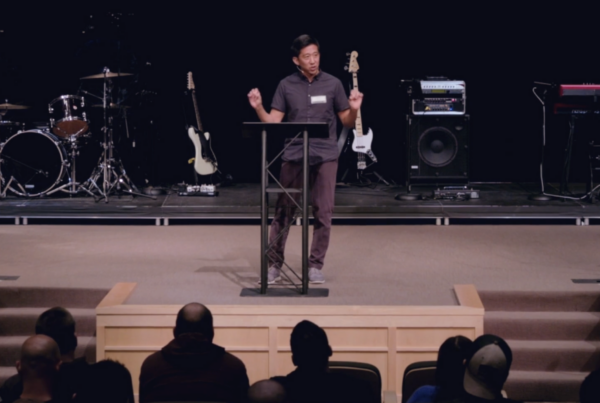My eight-year-old thinks he should be good at everything he does. When he watches baseball, he automatically assumes he should be able to catch, throw, hit, and run like the pros. “If I played Major League Baseball, I would probably steal a lot of bases.” Of course you would, son.
It’s obviously not as easy as the professionals make it look on TV. Baseball isn’t the only pursuit with a potentially wide gap between perception and reality. Good sermons, quiet times, and conversations with fellow believers excite and encourage us in the moment.
But applying a sermon on Monday morning is difficult. Living in light of what you read at 7:00 a.m. can be difficult by 8:00 a.m. The joy of fellowship can give way to the frustration of isolation when you hang up the phone or part ways in the coffee shop parking lot.
Following the Path of Most Resistance
Choosing to follow Jesus is choosing a narrow and difficult path. Here’s a quick survey of the type of language the Bible uses to describe discipleship and sanctification:
- Death (Mark 8:34)
- Refinement by fire (1 Pet. 1:7)
- Pruning (John 15:2)
- Suffering (2 Tim. 2:3)
- Trials (James 1:2) The joy of fellowship can give way to the frustration of isolation when you hang up the phone or part ways in the coffee shop parking lot. Click Para Twittear
These words don’t describe something easy, but rather something hard and painful. But let me be clear—hard doesn’t mean bad. Difficult doesn’t mean joyless. Yes, following Jesus is hard and difficult, but the path of most resistance is also the path of complete joy (John 15:11).
For pastors, part of shepherding the flock involves understanding what makes the reality of following Jesus hard for the sheep. Allow me to offer one caution and one encouragement as you equip the saints in your church to follow the Savior.
Caution: Unrealistic Expectations Are a Yoke of Slavery
Managing expectations is an important part of living as a sinner, with other sinners, in a sinful world. Many difficult situations I enter into as a pastor and counselor involve unrealistic or unbiblical expectations. As I mentioned above, the Bible doesn’t sugar-coat our experience. Following Jesus requires us to die to ourselves. Growing in Christ requires our pruning and refining, and all of this happens in a world quite literally hell-bent against us.
It’s important that we face each day understanding these realities: “Therefore, preparing your minds for action, and being sober-minded, set your hope fully on the grace that will be brought to you at the revelation of Jesus Christ” (1 Pet. 1:13). Growing in Christ requires our pruning and refining, and all of this happens in a world quite literally hell-bent against us. Click Para Twittear
Peter tells us to make sure that nothing impedes right-thinking as we look to Jesus and seek to follow him. I once spoke with a young lady struggling with anxiety. She told me about her circumstances and then summed up her experience by saying, “It just shouldn’t be this hard to follow Jesus.” Her expectation that following Jesus shouldn’t be hard made the reality of following Jesus that much harder! Her unbiblical expectation was a yoke of slavery that she was finding impossible to bear.
While a realistic expectation wouldn’t have changed her difficult circumstances, it would have better equipped her to navigate those circumstances without an extra dose of discouragement. She lacked a sober-minded approach to her daily walk with Jesus.
As pastors, we have a responsibility to help Jesus’s sheep think rightly about the difficulty (and joy!) of following him. Think about your preaching and teaching. How well do you empathize with the hurts and pains of those listening to you? If your applications don’t take into consideration the difficulty of following Jesus, you’ll either have a hard time connecting with people or you’ll create an unrealistic discipleship that your people will never live up to—suffering needlessly in the process.
Encouragement: Celebrate Simple Expressions of Faith
In a “bigger is better” culture, it’s easy to gloss over “simple” acts of faith and not appreciate their impact and value. However, every expression of faith is meaningful. It’s easy to assign value based on measurables in our results-driven society. But faith doesn’t always work that way; we don’t always see immediate results.
Because sanctification often happens slowly, over an extended period of time, judging the impact of our faith requires faith—we need spiritual eyes to see spiritual realities. As pastors, we must look for and encourage all expressions of faith. In a “bigger is better” culture, it’s easy to gloss over “simple” acts of faith and not appreciate their impact and value. However, every expression of faith is meaningful. Click Para Twittear
For some people, walking through the doors on Sunday morning feels like parting the Red Sea. For some, opening up their Bible and spending ten minutes with the Lord feels like slaying a Goliath. When people are laboring under the weight of hardship or calamity, seemingly simple tasks can take extraordinary amounts of energy. It’s never a small thing to come and worship with God’s people. It’s never a small thing to engage with the living God.
For some people that I counsel and care for, coming into my office and sitting down on the couch requires all the faith and trust they have. If I minimize their faith by failing to acknowledge their effort amid hardship, then I miss the opportunity to encourage them in their pursuit of Jesus. It’s never a small thing to come and worship with God’s people. It’s never a small thing to engage with the living God. Click Para Twittear
Following Jesus is hard. Helping people follow Jesus is also hard. As you shepherd the flock among you, seek to understand their unique barriers and obstacles to following Christ. Ask Jesus to give you eyes like his so you can take every opportunity to celebrate and encourage the faith of his sheep. My hope is that you will see the saints built up and equipped to persevere as they walk the narrow and joyful path of discipleship.










